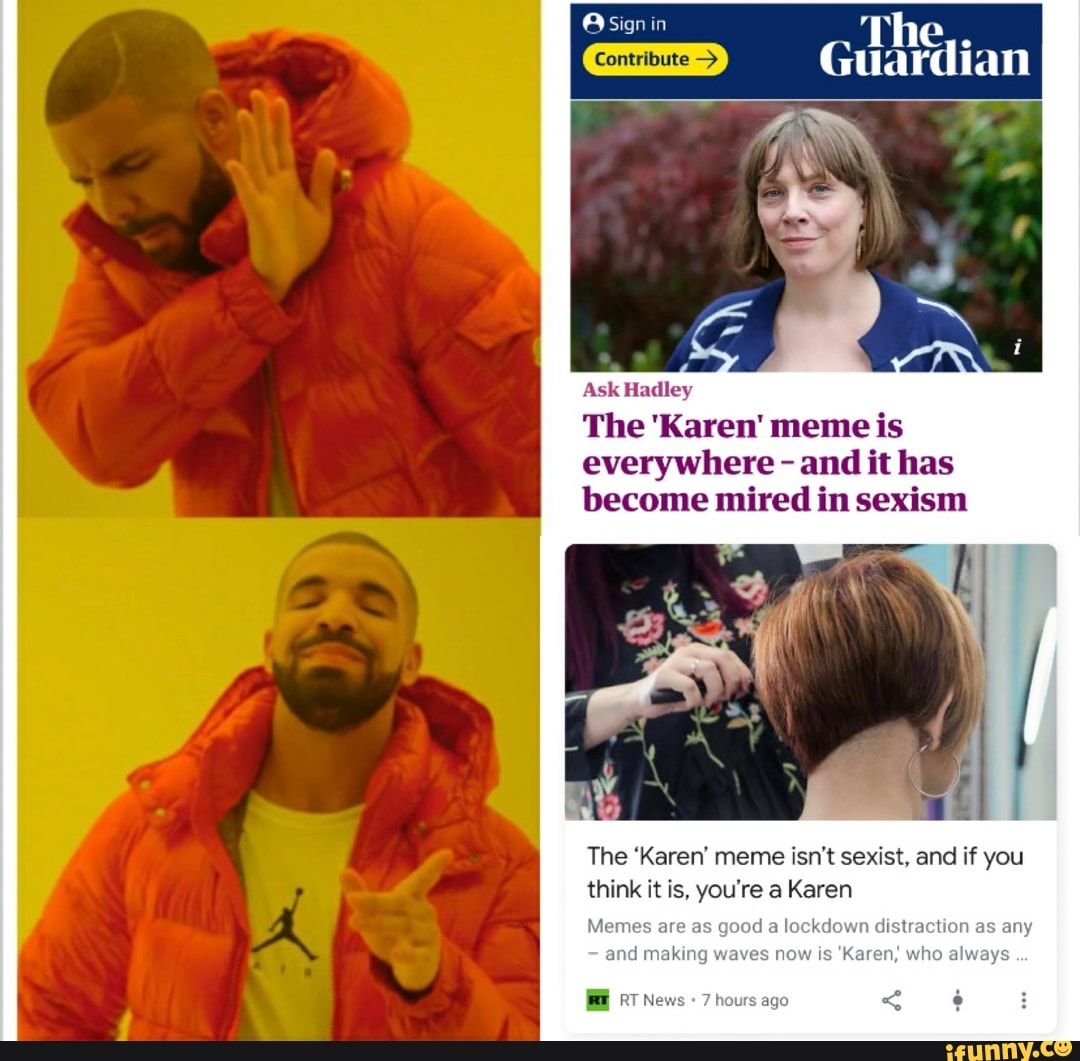
The "Karen" and Other Memes Against Equality
May 26, 2020 - Reading time: 7 minutes
Is it just me, or is that meme, but do you think that memes have made a noticeable shift, one that has move toward a sexist narrative? For those who are unfamiliar with the expression, Wikipedia frames the meme like this:
A meme is an idea, behavior, or style that spreads by means of imitation from person to person within a culture and often carries symbolic meaning representing a particular phenomenon or theme.
Memes have always been to some extent borderline bad taste, one could argue that they are
One that has been highly circulated of late is the Karen meme. And it is because of this meme that I choose to write this here today. If you aren't familiar with the meme then let me get you up to speed:
"You know Karen right?" "Everyone knows a Karen!" "Karen's a bitch!" In fact the name Karen has become synonymous with a derogative toward women. Hadley Freeman wrote on the Guardian on Mon 13 Apr 2020 that the Karen meme has become mired in sexism.

Where did the Karen meme originate from (quoted from the aforementioned article):
Karen” is commonly used in the US to refer to a strident middle-class white woman who talks down to people of colour, usually in serving-staff positions. But the term was never just about racial oppression. As Vox wrote in its extremely extensive history of the trope, the comedian Dane Cook was using it in his act in 2005: “Every [friendship] group has a Karen, and she’s always a bag of douche.” The term went more mainstream a few years ago when someone on Reddit wrote so much bile about his ex-wife that his posts got their own subreddit called “r/FuckYouKaren”. One of the most popular ever tweets using the Karen meme was posted a month ago, just before the lockdown: “I’m scared for people who actually need to go to the store & feed their fams but Susan and Karen stocked up for 30 years.” This was liked 1.2m times, because only women shop, apparently (and shop selfishly).
It isn't just the Karen though, the medium has allowed a highly sexist discourse to develop and become mainstream.
If there's one thing to note about the society we live in, it's gender roles, stereotypes, and discrimination in the age of communication is alive and well. The Internet has made the exchange of data effortless and with that ease it has accentuated certain mindsets, over the years the so-called memes have spread over the web and social networks like a virus. The main memes circulating on the net have a humorous tone and have a general tone, however, they are not limited to that and often can carry a totally different and stereotypical message, especially when it comes to memes about women.
If we look at some of the memes that are shared the most on social media, we see that the current trend is clear: women. They are the ones that appear as the protagonists of discriminatory memes propelled to the central element on which the taunts fall. The typical selfish girlfriend, the hateful mother-in-law or the unbearable wife are some of the most common ones you will see, in addition to the gender stereotypes that are also transmitted over the net. These biases which we have had ingrained in our minds from birth are currently being encouraged and further shaped as memes. The most common memes or trends that are usually covered in them promote the values of a patriarchal societies and through them discrimination against women.

One of the most common topics and forms of sexism is the vision of women as a mere housewife, we live in a society in which still believes at some level that women can/should do nothing but household chores such as washing and ironing clothes or cooking, among others. This belief is coupled with believing that women were born to serve their men, bare children, and raise a family, for it is believed that the perfect woman is that devoted wife and perfect housewife.
The memes we see, show how women are presented as someone who needs a man to live, because if they aren't they'll end up as someone with too many cats. But the main idea is that women are harpies capable of leaving men without money, because it is all they care about. Choose a negative trait for a person and there isn't a question that you won't be able to find a meme for it.
It would be easy to put a thousands of examples of sexist memes together that have gone viral. We could continue to exemplify topics and forms of sexism promoted through these memes such as the belief that women are: weak, promiscuous, frigid, or the belief that women are less intelligent than men, thus, a long etcetera. But the important thing is to highlight the messages in these memes.
Although they may seem funny, thus less harmful, because of their humorous tone, we must not forget that there is sexism in the small things such as a mockery. It does not matter if it is an insult or a meme, because they are messages that, despite so much progress, have yet to leave our cultural consciousness. Instead they have been passed on from one generation to the next, they have been there since our childhood, now they are multiplying quickly and are becoming embeded in our society and once again being accepted as a cultural norm, because in the end, if we end up accepting that they are natural we will accept that our place is reserved for the kitchen. That we have been chosen exclusively for the tasks of the domestic service; that the woman is a piece of meat at the disposal of man; that women are hysterical or that women are "sluts or shrews." Thus, memes shouldn't be so easily dismissed when they come to us, we shouldn't accept them without thinking, nor should we simply ignore them. Because the harm is there and memes carry real consequences, those messages transmit ideas and strengthen agendas and ideologies, and since digital media is easy, instant, and free the cost of creation is small. There are alternatives, they can be used to to promote effective equality between men and women while placing the scenarios that are promoting the stereotypes and roles that are imposed on us from our birth in the spotlight. The medium is the same, the message can be much different.
Now are you ready for a change of pace? Then try these, 50 feminist memes!
